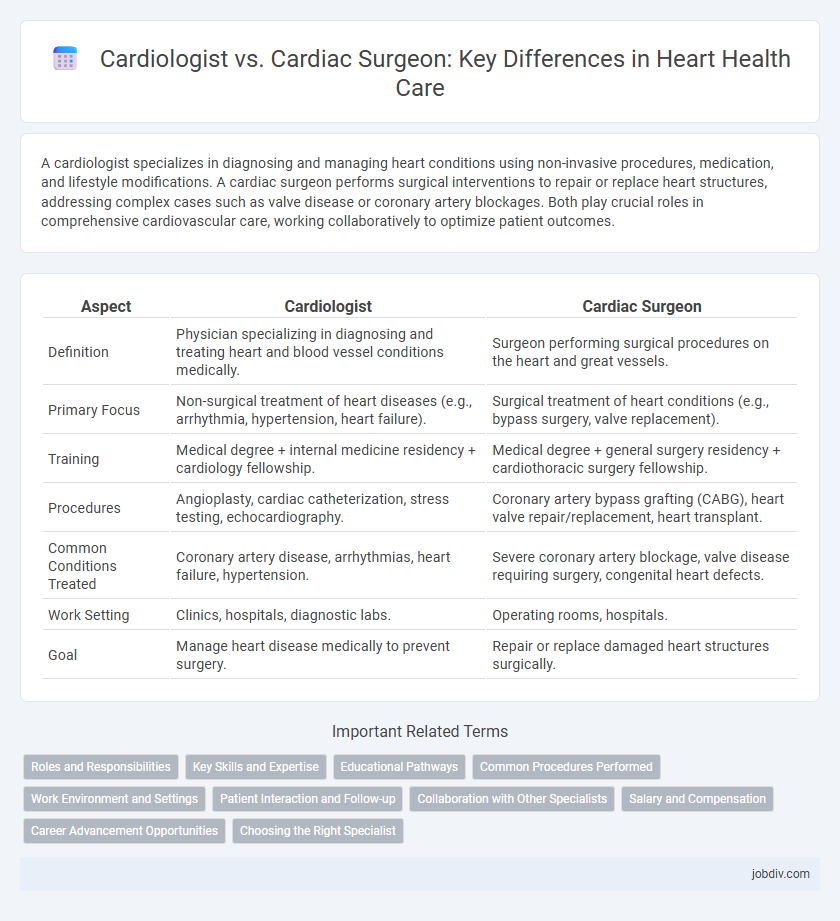A cardiologist specializes in diagnosing and managing heart conditions using non-invasive procedures, medication, and lifestyle modifications. A cardiac surgeon performs surgical interventions to repair or replace heart structures, addressing complex cases such as valve disease or coronary artery blockages. Both play crucial roles in comprehensive cardiovascular care, working collaboratively to optimize patient outcomes.
Table of Comparison
| Aspect | Cardiologist | Cardiac Surgeon |
|---|---|---|
| Definition | Physician specializing in diagnosing and treating heart and blood vessel conditions medically. | Surgeon performing surgical procedures on the heart and great vessels. |
| Primary Focus | Non-surgical treatment of heart diseases (e.g., arrhythmia, hypertension, heart failure). | Surgical treatment of heart conditions (e.g., bypass surgery, valve replacement). |
| Training | Medical degree + internal medicine residency + cardiology fellowship. | Medical degree + general surgery residency + cardiothoracic surgery fellowship. |
| Procedures | Angioplasty, cardiac catheterization, stress testing, echocardiography. | Coronary artery bypass grafting (CABG), heart valve repair/replacement, heart transplant. |
| Common Conditions Treated | Coronary artery disease, arrhythmias, heart failure, hypertension. | Severe coronary artery blockage, valve disease requiring surgery, congenital heart defects. |
| Work Setting | Clinics, hospitals, diagnostic labs. | Operating rooms, hospitals. |
| Goal | Manage heart disease medically to prevent surgery. | Repair or replace damaged heart structures surgically. |
Roles and Responsibilities
Cardiologists specialize in diagnosing and managing heart diseases using non-invasive tests, medications, and lifestyle modifications to treat conditions like arrhythmias, hypertension, and heart failure. Cardiac surgeons perform invasive surgical procedures such as coronary artery bypass grafting, heart valve repair, and heart transplants to correct structural heart problems. Both professionals collaborate closely to optimize patient outcomes in complex cardiovascular care.
Key Skills and Expertise
Cardiologists specialize in diagnosing and managing heart diseases through non-invasive techniques such as echocardiograms, stress tests, and cardiac catheterization, requiring expertise in interpreting complex cardiac imaging and managing medication regimens for conditions like arrhythmias and heart failure. Cardiac surgeons focus on performing invasive procedures including coronary artery bypass grafting, valve repair or replacement, and heart transplants, necessitating advanced surgical skills and comprehensive knowledge of cardiac anatomy and perioperative care. Both professionals collaborate closely in multidisciplinary cardiac care teams to optimize patient outcomes through complementary skills in diagnosis, treatment planning, and intervention.
Educational Pathways
Cardiologists complete medical school followed by a three-year internal medicine residency and a subsequent three-year cardiology fellowship focused on diagnosing and managing heart diseases. Cardiac surgeons undergo medical school, a general surgery residency lasting about five to seven years, and an additional two to three years of specialized training in cardiovascular or cardiothoracic surgery. The distinct educational pathways emphasize non-invasive heart disease treatment for cardiologists and surgical intervention expertise for cardiac surgeons.
Common Procedures Performed
Cardiologists specialize in diagnosing and treating heart conditions through non-invasive procedures such as echocardiograms, stress tests, and cardiac catheterization. Cardiac surgeons perform invasive surgical operations including coronary artery bypass grafting (CABG), valve repair or replacement, and heart transplants. Both play critical roles in cardiovascular care, with cardiologists managing medical treatment and cardiac surgeons addressing structural heart issues requiring surgery.
Work Environment and Settings
Cardiologists primarily work in outpatient clinics, hospitals, and diagnostic labs, focusing on non-invasive procedures like echocardiograms and stress tests. Cardiac surgeons operate mainly in hospital operating rooms and intensive care units, performing invasive procedures such as bypass surgery and valve replacement. Both specialists collaborate closely within multidisciplinary cardiac care teams to optimize patient outcomes.
Patient Interaction and Follow-up
Cardiologists specialize in diagnosing and managing heart diseases through non-invasive procedures, ensuring continuous patient interaction and personalized treatment plans. Cardiac surgeons perform surgical interventions for complex cardiac conditions, with patient contact primarily during preoperative assessment and postoperative recovery. Effective follow-up in cardiology involves regular monitoring and medication adjustments, while cardiac surgery follow-up emphasizes wound healing and long-term rehabilitation outcomes.
Collaboration with Other Specialists
Cardiologists and cardiac surgeons work closely with specialists such as radiologists, anesthesiologists, and primary care physicians to provide comprehensive cardiovascular care. Their collaboration ensures accurate diagnosis, effective treatment planning, and seamless perioperative management for patients with complex heart conditions. Multidisciplinary teamwork enhances patient outcomes by integrating expertise in medical management, surgical intervention, and postoperative rehabilitation.
Salary and Compensation
Cardiologists typically earn an annual salary ranging from $300,000 to $500,000, driven by their expertise in diagnosing and managing heart diseases through non-surgical means. Cardiac surgeons command higher compensation, often between $400,000 and $700,000, reflecting the complexity and risk involved in performing heart surgeries. Salary variations depend on factors such as geographic location, years of experience, and the type of healthcare facility.
Career Advancement Opportunities
Cardiologists specialize in diagnosing and managing heart diseases through non-surgical methods, often advancing their careers by pursuing sub-specialties such as electrophysiology or interventional cardiology. Cardiac surgeons focus on performing complex heart surgeries, with career growth typically involving mastery of minimally invasive techniques and leadership roles in surgical departments. Both careers offer research opportunities and participation in clinical trials to stay at the forefront of cardiovascular medicine.
Choosing the Right Specialist
Choosing the right specialist between a cardiologist and a cardiac surgeon depends on the nature of your heart condition. Cardiologists specialize in diagnosing and treating heart diseases through medication and non-invasive procedures, while cardiac surgeons perform complex surgeries such as bypass operations and heart valve repairs. Consulting with a cardiologist initially can help determine if surgical intervention by a cardiac surgeon is necessary for optimal heart health outcomes.
Cardiologist vs Cardiac Surgeon Infographic

 jobdiv.com
jobdiv.com